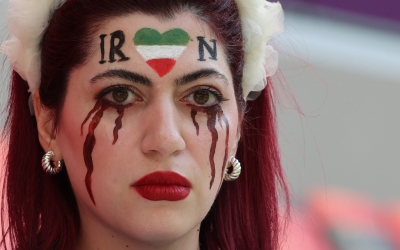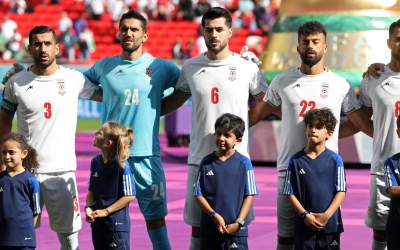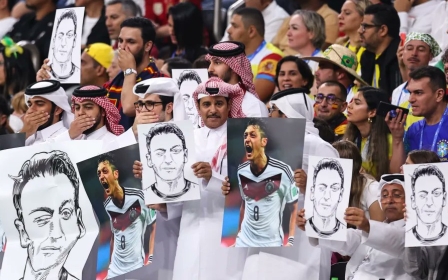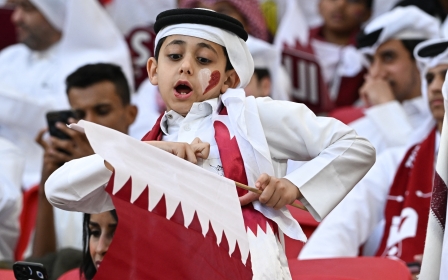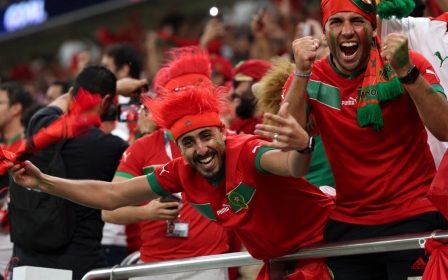World Cup 2022: Diaspora chooses not to support Iran in match against US
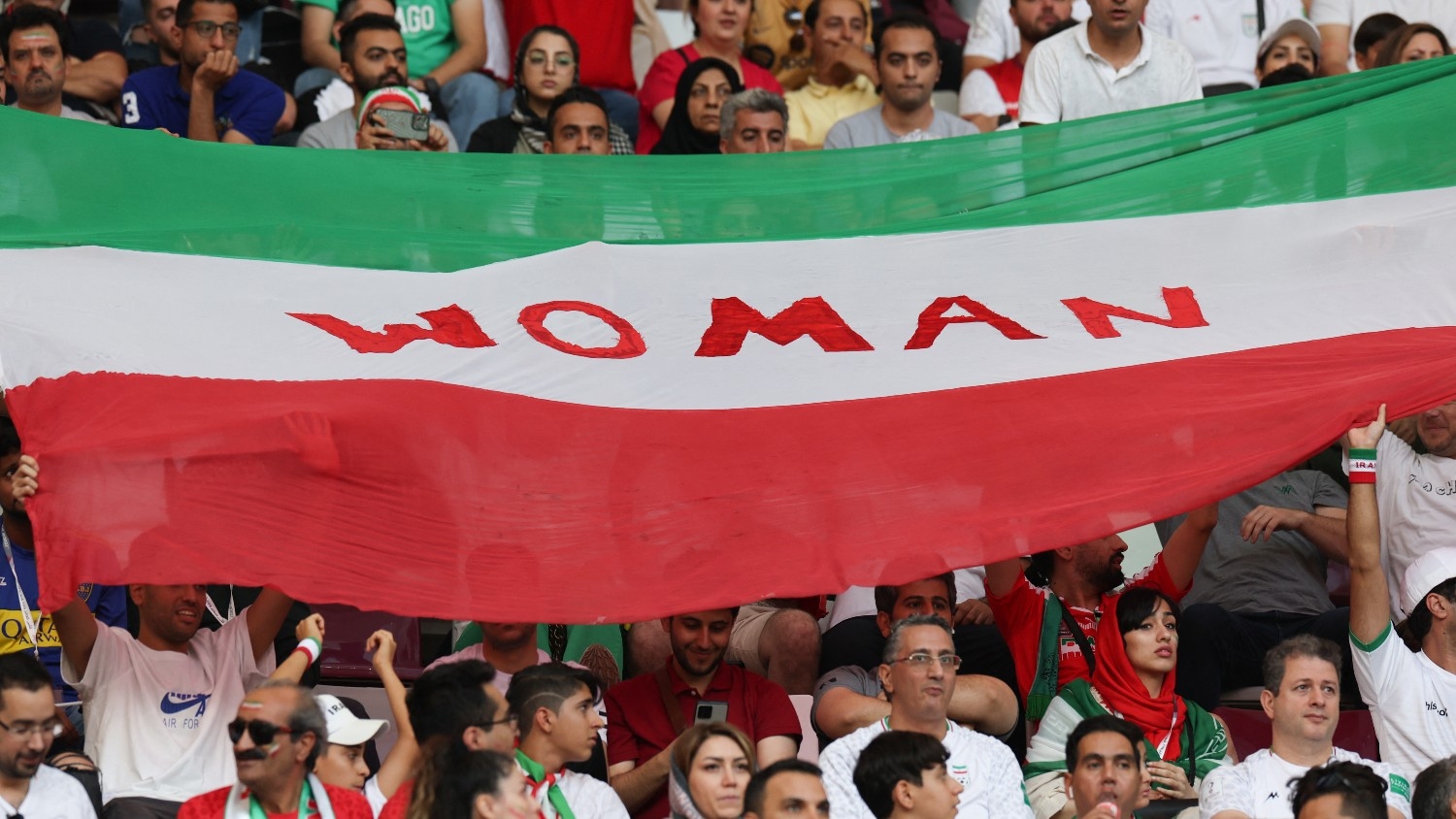
Negin Shiraz was five years old when Iran first faced off against the United States in the infamous 1998 World Cup match in France.
She remembered being on a bus with her mom as they were going home when Mehdi Mahdavikia scored the second goal to seal Iran's 2-1 victory, in what was one of the most politically charged matches in football history.
"When Iran scored the goal - the winning goal - everybody went crazy. Everybody was dancing and singing on the bus," Shiraz told Middle East Eye.
Now Iran and the US are facing off for the second time in World Cup history and the stakes are high, with the US needing a win to advance to the next round while the Iranian team could squeeze through with just a draw.
However, while Shiraz - who moved to the US after finishing her master's degree in Italy in 2019 - has supported Iran in the World Cup since that 1998 game, she made the difficult choice of not supporting her country's team this year.
With Team Melli having visited the country's president, Ebrahim Raisi, ahead of their trip to Qatar amid the ongoing protests in Iran over the killing of Mahsa Amini, Shiraz said she could not support the team this time around. During the meeting with Raisi, some players were shown smiling and laughing in the presidential palace.
"I really feel close to soccer because I know that it's a very popular sport in Iran, but my dad was a soccer player. And I literally grew up on soccer fields," she said.
"So this time it has really hit home for me with everything that's happening. And I wasn't able to support the national team the way I want it to. It's kind of sad."
Shiraz's dilemma is something shared across the Iranian diaspora in the United States. There are many political divisions within the community, from being in complete opposition to the Iranian government, to supporting it, and everywhere in between.
Throughout the past several decades, football had been a unifying force. Yet several fans and members of the Iranian diaspora told MEE that this year's national team has not done nearly enough to support the protests happening at home, compared to other Iranian athletes. And because of this, they're choosing not to support the team.
"I feel like all Iranians collectively root for Iran in the World Cup because it was something that brought the Iranian people together, and it gave them a sense of hope," said Mathew Khalili, a 20-year-old Iranian American born in the US.
Khalili, who lives in San Francisco - the state of California is home to the majority of Iranian-origin immigrants - said that he and other Iranians he knows in the area have supported and rooted for Iran to win in every international tournament prior to this World Cup.
"But I feel that the current situation in Iran and the political climate of it, the fact that the players met with the president right before their departure to Qatar, that was really disappointing to a lot of Iranians."
'Damage is already done'
The Iranian team headed to Qatar earlier this month, in one of the most domestically politically charged times in recent history.
Amini, a 22-year-old Kurdish woman, died in September after being detained by Iran's morality police, and her death has sparked widespread protests across the country.
According to rights groups, more than 300 people have been killed in the demonstrations. But despite the heavy crackdown by Iran's security forces, protests have continued, leading to officials calling on the Iranian government to reform its policies on women's dress code.
Iranian athletes have also appeared to have taken part in these protests, showing solidarity with those demonstrating in the country. Iranian rock climber Elnaz Rekabi competed in a competition in South Korea without wearing the mandatory headscarf and returned home to a hero's welcome in Tehran from protesters.
'This year, everyone's cheering when the opposing team is winning. It's just really chaotic'
- Ariana Afshar, Iranian American
Yet a few days after her competition, a post from Rekabi's Instagram account stated she had dropped her hijab by mistake, and said: "I firstly apologise for all the concerns I have caused."
Voria Ghafour, a Kurdish-Iranian football player who previously played for the country's national team and has strongly supported the protest movement, was arrested several days ago for "spreading propaganda" against Iran.
"All these other Iranian athletes were kind of protesting the regime and saying they are with the people. And then you have this current [football] team, and a lot of their actions seem to be in support of the regime," said Khalili.
During Iran's opening match with England, the Iranian football team chose not to sing the country's national anthem, in what was seen as a silent protest in solidarity with the demonstrations in Iran.
But in the following match versus Wales, which Iran won 2-0, the players sang the anthem in an uncomfortable performance contrasted with vigorous singing by their Welsh counterparts during their national anthem.
"Iranians don't really care if they did not sing the national anthem. It doesn't sit right with us in terms of the things they have already done. So the damage is already done, it doesn't really matter what they do after," Shiraz said.
However, Ariana Afshar, an Iranian-American political content creator based in California, said that she is trying not to judge the team until the tournament fully plays out, to see where they end up standing.
Afshar was born in the US but lived in Iran for a year during the 8th grade and said she too had been arrested by the morality police.
"I don't speak for every single one of the Iranian diaspora, but people are frustrated that the team couldn't do more. It seems like from the diaspora's perspective, the team is trying to play both sides. They're bowing down to Raisi and then they're going out on the field, but then they're not playing the anthem," Afshar told MEE.
"Personally, for myself, though, I hold a bit more of an unpopular opinion," she added. "I think after seeing what happened to Elnaz Rekabi, and then kind of watching this global World Cup come to play, I just don't think I'm in the place where I can judge how the players deal with the uprisings happening right now."
Still, Afshar has decided to opt out of watching the match altogether.
"This year, everyone's cheering when the opposing team is winning. It's just really chaotic," she said.
"I tried to watch a couple of games, but I saw the sense of pride that the other teams and their fans had, and then I watched the Iranian team and the first game where they were silent and people in the stadiums were booing and it was just - it's just too much."
US vs Iran
The match between the US and Iran on Tuesday will be the second time the teams face off at a World Cup.
The previous matchup in 1998 served as a pivotal moment for US-Iranian relations after the Iranian team presented the US team with white roses as a symbol of peace. Eighteen months after the match, the two sides met again for a friendly match in Pasadena, California.
Tensions have been brewing between the two countries for several years now, as former US President Donald Trump withdrew from the Iran nuclear deal, reimposed sanctions, and killed Iranian general Qassem Soleimani in a drone strike.
Meanwhile, Iran has continued to reduce its commitments to the nuclear deal after the US left it. And Tehran has provided Russia with drones that have been used in Moscow's war in Ukraine.
The US team has already angered the Iranian side ahead of the US-Iran match, using a flag without the Islamic Republic's emblem in an online post. Tehran responded by calling for the US to be kicked out of the tournament entirely.
For some Iranian football fans in the US, however, they will be sitting this game out rather than choosing to support either side.
"This time we're not supporting the Iranian team, and we're not supporting the US team per se," Shiraz said. "I will be watching the game but I will not be supporting the teams."
Khalili said that for him and other Iranians he knows, given the government's crackdown on the protests and the appearance that the football team is supporting the government, he would rather see the US win.
"I definitely can't speak for all Iranians. But from what I've seen, a lot of people in the US and Iran and in the diaspora seem to be leaning more towards the United States because they feel like the Iranian national team is not a representation of the Iranian people, but rather a representation of the Islamic Republic," he said.
Khalili said a win on Tuesday would only embolden the government and help detract from the protest movement. "And by the way, this is coming from someone who has always rooted for Iran."
When Iran beat Wales, the country's security forces moved quickly to capitalise on the patriotic mood, with state news agencies running pictures of smiling security forces waving Iranian flags.
Ahead of the US-Iran match, a campaign has been launched to call on all players and fans to take a knee in solidarity with Mahsa Amini and the protesters in Iran.
"Iranians are going to support America," said Shiraz. "But they're not cheering on the United States per se. But they are cheering against the team they feel betrayed by."
Middle East Eye propose une couverture et une analyse indépendantes et incomparables du Moyen-Orient, de l’Afrique du Nord et d’autres régions du monde. Pour en savoir plus sur la reprise de ce contenu et les frais qui s’appliquent, veuillez remplir ce formulaire [en anglais]. Pour en savoir plus sur MEE, cliquez ici [en anglais].


